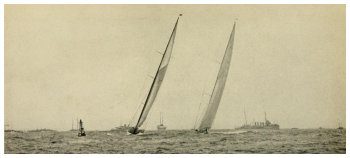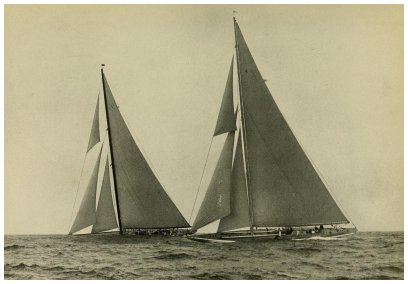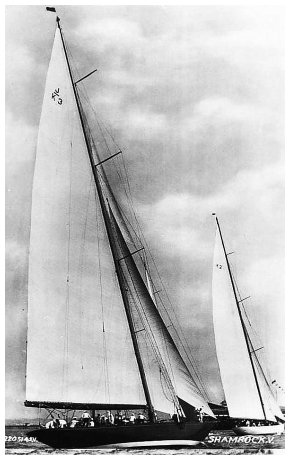Yves GARY Hits: 4080
Category: 1930 : CHALLENGE N°14
 SHAMROCK DISABLED, ENTERPRISE SAILS ON TO WIN THIRD RACE
SHAMROCK DISABLED, ENTERPRISE SAILS ON TO WIN THIRD RACENEWPORT, R.I., Sept. 17.-- Enterprise, defender of the America's Cup, swept on today to her third straight victory over Shamrock V, Sir Thomas Lipton's challenger.
Three-quarters of an hour after the start of the race between his challenger and the Enterprise, the mainsail halyard of Shamrock V parted inside the mast and the mainsail folds in flash. Harold S. Vanderbilt, skipper of Enterprise, declared after sailing the defender back to Brenton Cove, that the accident to Shamrock V, preventing her from racing the full course, was unfortunate.

 The race narrated by Harold S. Vanderbilt :
The race narrated by Harold S. Vanderbilt :On Wednesday, the day of the third race, there was a 12-knot W.S.W. breeze and a slop of a sea at the start. Visibility was good and conditions ideal for racing. The committee signaled a windward and leeward course.
The start was the most interesting of the series. After running our time on the formula, we jibed, with 3 minutes to go, and headed, with wind abeam, for the buoy end of the line on the starboard tack. We had broken out our No. 3 jib topsail and were moving along under full headway. Shamrock V, approaching us on the port tack, tacked (with about 1 ½ minutes to go) broad on our lee bow, and, holding up sharp on the wind, crossed our bow by three lengths.
She was ahead of the gun and, presumably to kill time, held up to windward of the buoy at the weather end of the line, then bore off sharply and passed to leeward of the buoy about 30 seconds before gun fire. Meanwhile we had been overhauling her rapidly — we were traveling at least three feet to her two — and with 30 seconds to go and our bow close up to her counter, we had to decide whether to establish our overlap on her windward or leeward side. We chose the latter alternative. She could have forced us over the line ahead of time if we had gone to windward. A few seconds later she bore sharply down on us and got our wind — reducing our speed to the one at which she was traveling. We both luffed for the line as the starting whistle sounded. Our wind was clear after luffing, but it seemed only a question of time when the challenger would have it again.
 Two minutes after the start, while the Challenger's crew was busy trimming the main sheet, we tacked and she was unable to follow suit quickly enough to cover us. The best time to execute a maneuver of this kind is when your rival is busy doing something which prevents immediate action on his part. Soon after tacking we out-winded Shamrock V, and within a few minutes her bow was close to our weather quarter. Our backwind forced her to tack and we tacked with her. The tables had been reversed; we had become leading boat.
Two minutes after the start, while the Challenger's crew was busy trimming the main sheet, we tacked and she was unable to follow suit quickly enough to cover us. The best time to execute a maneuver of this kind is when your rival is busy doing something which prevents immediate action on his part. Soon after tacking we out-winded Shamrock V, and within a few minutes her bow was close to our weather quarter. Our backwind forced her to tack and we tacked with her. The tables had been reversed; we had become leading boat.
For the next half hour both boats held the starboard tack. Enterprise gradually worked out to windward; evidently Shamrock V did not relish the head sea she was plunging into on this tack.
Forty-four minutes after the start, the Challenger's main halyard parted, her sail came clattering down on deck and she was forced to withdraw. The Defender at the moment had at least a 2-minute lead. We sailed on, rounded the weather mark and ran back under spinnaker and ballooner, finishing at 3:34:16.
| RACE 3 - SEPTEMBER 17 - 15 miles to windward and return | |||||||
| START | FINISH | 1st LEG | 2nd LEG | RACE | GAP | ||
| 1 | Enterprise | 11:40 | 3:34:16 | 2:13:33 | 1:40:43 | 3:54:16 | |
| 2 | Shamrock V | 11:40 | DNF | ||||
We did not even discuss the possibility of withdrawing from the race after Shamrock V broke down. We were all very sorry that she had met with an accident and that we had to accept a race won in this manner. We appreciated that we would be criticized whatever course we pursued; but it was our duty to finish in accordance with a long-established custom in the America's Cup Races. Failure of gear is as good a reason as any other for loss of a race. The best interests of the sport require a yacht to finish when a rival is forced to withdraw by a breakdown; otherwise there would be no penalty for carrying inadequate spars or rigging.
